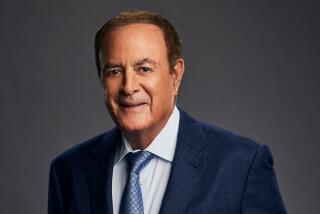Executive to Add Color to His Life--as Olympics Analyst
- Share via
James R. Kruse has all the accouterments of the good life. He lives on Balboa Island, has season tickets to the Rams, a car phone, a big corner office overlooking Anaheim Stadium and something else: He is a television star.
Well, maybe not a star, exactly, but as close as you are likely to get when your real business--the job that pays the bills--is selling warehouses and office buildings. Come September, though, Kruse will be missing from the corner office for 25 days when he flies to Korea and turns into Jim Kruse, color commentator for NBC at the 1988 Olympics.
Kruse’s specialty is water polo. Not exactly a high visibility sport, since it is not very popular outside California. But if the U.S. team wins a few games, well, who knows? Kruse might get as much air time as he did in the 1984 Los Angeles Olympics, when the Eastern bloc boycotted the games and the U.S. team did very well indeed, winning the silver medal and getting on television half a dozen times.
At 35, Kruse wears quiet business suits and shoes polished to a high gloss as part of the executive image he now cultivates. But for much of his college career in the early 1970s he wore nothing but a swim suit as an All-America water polo player at UC Irvine.
That led to the 1976 Olympic team and the modest sort of athletic fame that comes with proficiency in a sport considered esoteric in most parts of the country. At least one of the headlines in the local paper wasn’t about his playing at all; it recounted the young Kruse’s scathing blast at the officiating of Eastern bloc officials.
In some ways the business world seems to have mellowed him since then, though he still admits to a strong streak of competitiveness. And he admires it in others: Kruse likes to hire ex-college athletes at the two offices of Schneider Commercial Real Estate he runs as vice president and general manager.
The television gig, though, he approaches with a self-deprecating sense of humor, evident in the story he tells about his first stab at broadcasting:
During the taping of a pregame show in the 1984 Olympics, Kruse thought he still had five seconds before the cameras went on. “I reached up to scratch my nose, and I could hear the producer yelling through my earphone. We were actually taping, and I caused nine guys--all the cameramen and technicians--to have to start all over again. Pretty embarrassing.”
After a few weekends of training with the television paraphernalia, you just go out and try not to put your foot in your mouth too often, Kruse said, as did football player Lynn Swann, another ex-athlete who went through the television training with Kruse. Swann, Kruse said, exclaimed during a particularly impressive clean-and-jerk by a weightlifter: “What a jerk!”
Kruse was born in Orange, in a hospital he can see from his Anaheim office on a clear day. He grew up small and underweight in Fullerton and says he picked water polo in high school because he didn’t have to be all that big to play and because his friends were playing.
After college Kruse got a job as an English teacher and water polo coach at Corona del Mar High School, but Proposition 13 wiped out the job. The athletic director at UCI introduced him to a commercial real estate broker, and he has been in the industry since.
After working for several companies over the last 10 years, Kruse recently joined Schneider, which is headquartered in Santa Ana and specializes in marketing commercial buildings smaller than the sprawling plants and high-rise office towers the giant brokers handle. Kruse is now in charge of 40 people at the Anaheim and San Bernardino offices.
Kruse has hired several ex-water polo players from UCI as brokers because he thinks they can compete better in the modest niches the company has carved out for itself. Unlike athletes in more glamorous sports, water polo players “have never been coddled, never had a high profile,” he said. “There’s not a prima donna mentality in the sport because not that many people outside California even care about it.”
“And these people are strong competitors,” Kruse said, pointing to the brokers whose desks are clumped together just outside his office. “They have to be because they’re totally on commission. If they don’t produce, they don’t eat.”
Kruse says he works 12 hours a day, from 7 a.m. to 7 p.m., which--it turns out--is not all that different from the broadcasting job, which can also be grueling. This year he will have a new boss--ABC televised the Olympics in 1984--but otherwise he expects little will have changed.
“You watch five or six games a day, and even when they’re not being broadcast you do probably one quarter each game like a live broadcast, just for the practice,” he said. “You never can tell when a boxing match is going to end early and the producer may switch over to you. You get in at 7 a.m., and you don’t leave until 11 p.m. Those are long, long days.”
In fact, after the first flush of excitement wears off, broadcasters can get “Olympicked out,” Kruse said. “You’re listening to everything on earphones, and 97 times a day you hear those trumpets playing the Olympic fanfare. After a while you can get pretty sick of it.
“But as soon as that red light on the top of the camera goes on, you get a jolt. You get up for it.”
More to Read
Go beyond the scoreboard
Get the latest on L.A.'s teams in the daily Sports Report newsletter.
You may occasionally receive promotional content from the Los Angeles Times.






